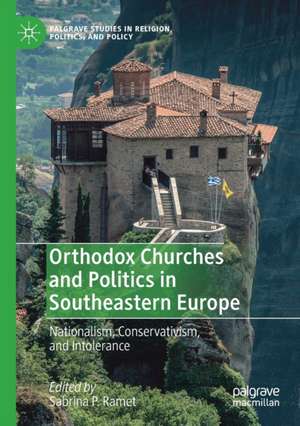Orthodox Churches and Politics in Southeastern Europe: Nationalism, Conservativism, and Intolerance: Palgrave Studies in Religion, Politics, and Policy
Editat de Sabrina P. Rameten Limba Engleză Paperback – oct 2020
Orthodox Churches, like most religious bodies, are inherently political: they seek to defend their core values and must engage in politics to do so, whether by promoting certain legislation or seeking to block other legislation. This volume examines the politics of Orthodox Churches in Southeastern Europe, emphasizing three key modes of resistance to the influence of (Western) liberal values: Nationalism (presenting themselves as protectors of the national being), Conservatism (defending traditional values such as the “traditional family”), and Intolerance (of both non-Orthodox faiths and sexual minorities). The chapters in this volume present case studies of all the Orthodox Churches of the region.
| Toate formatele și edițiile | Preț | Express |
|---|---|---|
| Paperback (1) | 779.89 lei 6-8 săpt. | |
| Springer International Publishing – oct 2020 | 779.89 lei 6-8 săpt. | |
| Hardback (1) | 783.98 lei 6-8 săpt. | |
| Springer International Publishing – oct 2019 | 783.98 lei 6-8 săpt. |
Din seria Palgrave Studies in Religion, Politics, and Policy
- 9%
 Preț: 683.53 lei
Preț: 683.53 lei - 15%
 Preț: 637.13 lei
Preț: 637.13 lei -
 Preț: 384.48 lei
Preț: 384.48 lei -
 Preț: 385.62 lei
Preț: 385.62 lei - 15%
 Preț: 640.06 lei
Preț: 640.06 lei -
 Preț: 386.39 lei
Preț: 386.39 lei -
 Preț: 389.70 lei
Preț: 389.70 lei -
 Preț: 396.40 lei
Preț: 396.40 lei -
 Preț: 387.75 lei
Preț: 387.75 lei -
 Preț: 388.72 lei
Preț: 388.72 lei -
 Preț: 389.88 lei
Preț: 389.88 lei - 18%
 Preț: 948.92 lei
Preț: 948.92 lei - 18%
 Preț: 730.79 lei
Preț: 730.79 lei - 18%
 Preț: 730.65 lei
Preț: 730.65 lei - 18%
 Preț: 950.33 lei
Preț: 950.33 lei - 18%
 Preț: 785.74 lei
Preț: 785.74 lei -
 Preț: 415.95 lei
Preț: 415.95 lei - 18%
 Preț: 790.46 lei
Preț: 790.46 lei - 18%
 Preț: 894.03 lei
Preț: 894.03 lei - 15%
 Preț: 638.11 lei
Preț: 638.11 lei -
 Preț: 486.80 lei
Preț: 486.80 lei - 15%
 Preț: 526.83 lei
Preț: 526.83 lei - 15%
 Preț: 466.95 lei
Preț: 466.95 lei -
 Preț: 389.49 lei
Preț: 389.49 lei - 18%
 Preț: 726.55 lei
Preț: 726.55 lei - 18%
 Preț: 776.88 lei
Preț: 776.88 lei - 18%
 Preț: 890.85 lei
Preț: 890.85 lei - 18%
 Preț: 786.52 lei
Preț: 786.52 lei -
 Preț: 396.40 lei
Preț: 396.40 lei - 15%
 Preț: 633.66 lei
Preț: 633.66 lei - 15%
 Preț: 640.37 lei
Preț: 640.37 lei -

-

Preț: 779.89 lei
Preț vechi: 951.08 lei
-18% Nou
Puncte Express: 1170
Preț estimativ în valută:
149.25€ • 155.24$ • 123.22£
149.25€ • 155.24$ • 123.22£
Carte tipărită la comandă
Livrare economică 15-29 aprilie
Preluare comenzi: 021 569.72.76
Specificații
ISBN-13: 9783030241414
ISBN-10: 3030241416
Pagini: 267
Ilustrații: XVII, 267 p. 1 illus.
Dimensiuni: 148 x 210 mm
Greutate: 0.38 kg
Ediția:1st ed. 2019
Editura: Springer International Publishing
Colecția Palgrave Macmillan
Seria Palgrave Studies in Religion, Politics, and Policy
Locul publicării:Cham, Switzerland
ISBN-10: 3030241416
Pagini: 267
Ilustrații: XVII, 267 p. 1 illus.
Dimensiuni: 148 x 210 mm
Greutate: 0.38 kg
Ediția:1st ed. 2019
Editura: Springer International Publishing
Colecția Palgrave Macmillan
Seria Palgrave Studies in Religion, Politics, and Policy
Locul publicării:Cham, Switzerland
Cuprins
1. The Orthodox Churches of Southeastern Europe: Nationalism, conservativism, and intolerance.- 2. Faith, Nation, and Structure: The diachronic durability of Orthodox Churches in the Balkans.- 3. Conservative Orthodoxy in Romania.- 4. The Bulgarian Orthodox Church: Authoring/advancing a new vision about the Orthodox Church’s role in the contemporary life of Bulgarian society and its historical memory.- 5. Serbian Orthodox Church post 1989.- 6. The relationship between the Serbian Orthodox Church and the Yugoslav/post-Yugoslav Jewish community.- 7. The Greek Orthodox Church.- 8. The Macedonian Orthodox Church in the New Millennium.- 9. Navigating the Post-Modern World: The Albanian Orthodox Church’s century of transition.- 10. The Orthodox Church of the Czech Lands and Slovakia: Examining the ambivalence and ambiguity of its historical role.- 11. Afterword.
Notă biografică
Sabrina P. Ramet is Professor Emerita of Political Science at the Norwegian University of Science and Technology (NTNU), in Trondheim, Norway. Born in London, Great Britain, she earned her Ph.D. in Political Science at UCLA in 1981 and moved to Norway in 2001. She is the author of 14 books, including, most recently, Alternatives to Democracy in Twentieth-Century Europe: Collectivist visions of modernity (Central European University Press, 2019).
Textul de pe ultima copertă
Orthodox Churches, like most religious bodies, are inherently political: they seek to defend their core values and must engage in politics to do so, whether by promoting certain legislation or seeking to block other legislation. This volume examines the politics of Orthodox Churches in Southeastern Europe, emphasizing three key modes of resistance to the influence of (Western) liberal values: Nationalism (presenting themselves as protectors of the national being), Conservatism (defending traditional values such as the “traditional family”), and Intolerance (of both non-Orthodox faiths and sexual minorities). The chapters in this volume present case studies of all the Orthodox Churches of the region.
Caracteristici
Thematically organized around the themes of Nationalism, Conservatism, Homophobia, and Religious Intolerance Includes a chapter dedicated to the problem of anti-Semitism in Serbia Based on original primary research from a diverse group of contributors in European Studies, Politics, International Relations, Theology, History, etc
